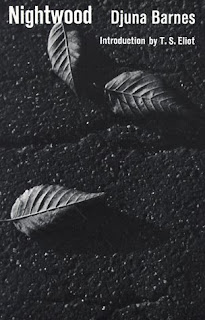Nightwood, by Djuna Barnes
 In his introduction, T.S. Eliot has an excellent consideration of Nightwood's relation to poetry—what we might be inclined to ask while reading the novel—is this a prose poem?
In his introduction, T.S. Eliot has an excellent consideration of Nightwood's relation to poetry—what we might be inclined to ask while reading the novel—is this a prose poem?In describing Nightwood for the purpose of attracting readers to the English edition, I said that it would "appeal primarily to readers of poetry." This is well enough for the brevity of advertisement, but I am glad to take this opportunity to amplify it a little. I do not want to suggest that the distinction of the book is primarily verbal, and still less that the astonishing language covers a vacuity of content. Unless the term "novel" has become too debased to apply, and if it means a book in which living characters are created and shown in significant relationship, this book is a novel. And I do not mean that Miss Barnes's style is "poetic prose." But I do mean that most contemporary novels are not really "written." They obtain what reality they have largely from an accurate rendering of the noises human beings currently make in their daily simple needs of communication; and what part of a novel is not composed of these noises consists of a prose which is no more alive than that of a competent newspaper writer or government official. A prose that is altogether alive demands something of the reader that the ordinary novel-reader is not prepared to give. To say that Nightwood will appeal primarily to readers of poetry does not mean that it is not a novel, but that it is so good a novel that only sensibilities trained on poetry can wholly appreciate it. Miss Barnes's prose has the prose rhythm that is prose style, and the musical pattern which is not that of verse. This prose rhythm may be more or less complex or elaborate, according to the purposes of the writer; but whether simple or complex, it is what raises the matter to be communicated, to the first intensity.I am intrigued by this last line about the "first intensity." It seems to me rather strange to be talking about a book of some 170 pages as if it all existed on a singular plane of "first intensity." Of course, it also would seem odd to me to suggest that a poem of the length of, say "In Memoriam A.H.H." might entirely exist at this sustained level. Even Hart Crane's "The Bridge" has some slack patches. Maybe "The Wasteland" doesn't, but it is not all that long, and it is rather anomalous in that very few short poems can really compare to it in intensity.
Eliot's emphasis on intensity seems to me to be rather specific to lyric poetry, and this leads me to wonder whether Eliot really means that "only sensibilities trained on lyric poetry can wholly appreciate it." I don't really believe that he is suggesting that long immersion in The Aeneid or The Village or The Prelude is the best preparation for reading Nightwood. (Browning's dramatic monologues split the difference {and actually would make an excellent comparison to this book}, but I doubt that Eliot intends this as his reference.)
But I wonder whether longer poems aren't better preparation for the reading and appreciation of this novel; as with most long poems, one reads (or at any rate I read, perhaps poorly) first for passages of exceptional intricacy, beauty, or power, marking those for more detailed attention, but rushing a little through the not-very-striking bulk of the work. If I encounter a problem of understanding, I read more carefully through what I have rushed and work my way back toward one of the striking passages I have flagged. I suppose I trust myself enough that I assume that the poem's most concentrated and most significant passages are going to be the ones which first stood out to me, and that if this is not entirely true, and there is significance in what does not stand out, it will still be tugged a little toward the passages of greatest beauty, and I can find my way through any rough patches by using those most striking moments as guideposts, orienting myself by them.
This process was how I read Nightwood, and I'd like to think that it worked—I enjoyed the book quite a bit, and while I don't exactly feel as if I exhausted the book's meaning, I don't know if that is really the best way to read it anyway: not all modernist works are hierophanies.
But in particular, this book is given to a degree of sententiousness which makes this type of reading almost impossible to avoid: these apothegms, like those below, are such dense little nuggets of meaning that one almost can't avoid pausing on them. The fluidity of most of the imagery and the action of the novel forces these readily quotable aphorisms to obtrude:
An image is a stop the mind makes between uncertainties.These gnomic proverbs actually make a little bit of sense in context, but you'll have to take my word for that, or read the book and see if they catch your attention too.
Death is intimacy walking backward.
Time is a great conference planning our end.
Youth is only the past putting a leg forward.
Bend down the tree of knowledge and you'll unroost a strange bird.
Comments